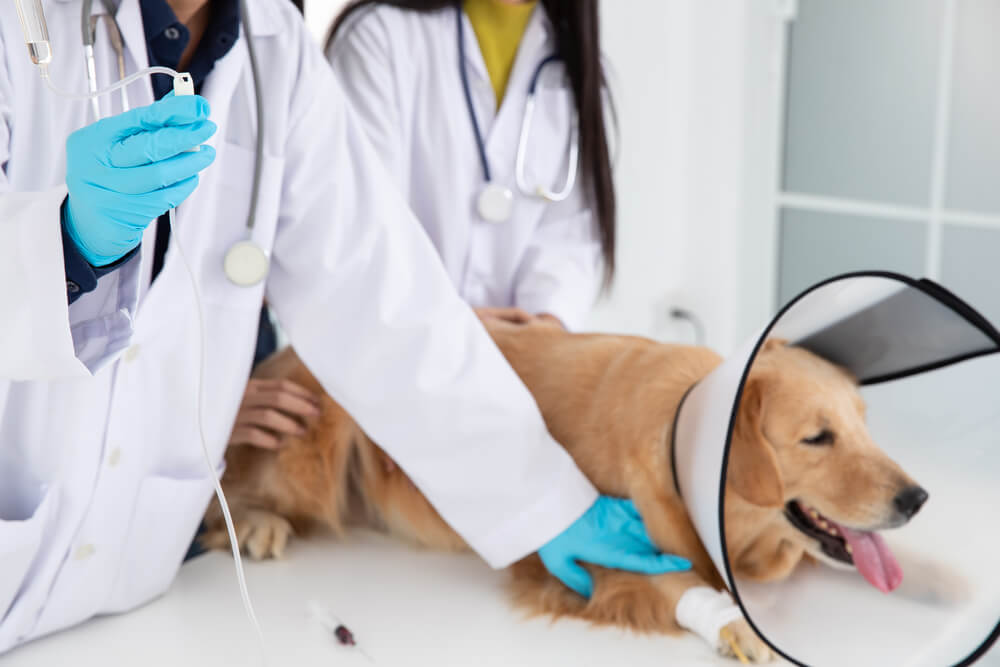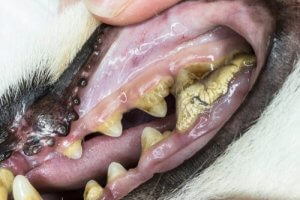3 Common Health Conditions in Older Dogs

The aging process in dogs isn’t all that different to that of a human. As they get older, dogs start to experience a number of changes in their bodies. This can lead to changes in their daily routine, and even their temperament.
Physical changes in older dogs
Understanding the typical physical changes your dog will go through as it gets older will allow you to adapt their diet, care, and exercise routine in order to give your pet exactly what it needs. Considering everything they do for us in their lifetime, it’s the least they deserve.
1. Joint pain
Dogs retain much of the vitality and energy they had as puppies for most of their adult lives. Their aging process isn’t quite as gradual as ours. In fact, old age comes late for dogs. It appears suddenly, and you may notice a very obvious difference in your pet, seemingly overnight.

One of the most common problems in older dogs is osteoarthritis – a rheumatic disease that damages the joint cartilage. This causes pain in the joints, stiffness, and loss of mobility. As a result, the animal being won’t be able to move as quickly and nimbly as it once did.
Osteoarthritis is more common in dogs that are overweight, and those that have spent a lot of time doing high-intensity physical activities. Both of these factors cause huge amounts of wear and tear in the joint capsules. This causes the bones to rub against each other painfully.
Dogs suffering from this condition will have difficulty maintaining their usual pace when out on walks. In some cases, the pain can be so severe that they may not want to go on walks at all. You may also notice changes in their movements. They’ll often hold their legs stiffly as they walk, moving less fluidly and naturally than before. This is often more noticeable when walking up or down stairs.
Contrary to what you might think, the best way to combat joint pain is to make sure your dog continues to do moderate exercise to keep them in good shape. It’s also important to manage their weight, to avoid putting any extra strain on the joints.
2. Heart disease in older dogs
Heart conditions are another common problem in older dogs. These normally involve the heart valves, which are the part of the heart most likely to suffer degenerative changes over the years. This often means that the heart can’t pump blood around the body as efficiently as it should. This can lead to a number of other serious health issues.

The passage of blood from the atrium to the ventricle is not as efficient if the valve separating them isn’t functioning properly. Over time, this valvular insufficiency can eventually lead to heart failure, which can be fatal for your pet.
One of the main symptoms your vet will look for in order to diagnose an early case of heart disease is an abnormally high heart rate. This happens when the heart tries to compensate for the valvular insufficiency, increasing the heart rate in an attempt to keep blood flowing normally.
This type of health condition in older dogs is difficult to detect unless you’re a qualified vet. As such, it’s best to take your pet for regular routine check-ups as they start to get older.
3. Dental problems in older dogs
Dental disease is one of the most common problems in older dogs. Just like people, dogs suffer from dental problems as they get older, so it’s important to take steps to make sure they don’t end up with a painful condition.

The type of diet your pet has eaten throughout its life will make a huge difference to the state of its teeth as it gets older. For example, eating too much wet food often leads to an increase in the build-up of plaque. In the long-run, this can cause infections, and lead to tooth loss.
When excess tartar and plaque increases, it can cause gum disease, along with a series of other problems that affect the rest of the mouth. This, in turn, can cause infections and other serious issues. Taking good care of your dog’s teeth from a young age is the best way to avoid problems in the future. It’s also important to provide them with a nutritious, balanced diet, to promote healthy teeth and gums.
The aging process in dogs isn’t all that different to that of a human. As they get older, dogs start to experience a number of changes in their bodies. This can lead to changes in their daily routine, and even their temperament.
Physical changes in older dogs
Understanding the typical physical changes your dog will go through as it gets older will allow you to adapt their diet, care, and exercise routine in order to give your pet exactly what it needs. Considering everything they do for us in their lifetime, it’s the least they deserve.
1. Joint pain
Dogs retain much of the vitality and energy they had as puppies for most of their adult lives. Their aging process isn’t quite as gradual as ours. In fact, old age comes late for dogs. It appears suddenly, and you may notice a very obvious difference in your pet, seemingly overnight.

One of the most common problems in older dogs is osteoarthritis – a rheumatic disease that damages the joint cartilage. This causes pain in the joints, stiffness, and loss of mobility. As a result, the animal being won’t be able to move as quickly and nimbly as it once did.
Osteoarthritis is more common in dogs that are overweight, and those that have spent a lot of time doing high-intensity physical activities. Both of these factors cause huge amounts of wear and tear in the joint capsules. This causes the bones to rub against each other painfully.
Dogs suffering from this condition will have difficulty maintaining their usual pace when out on walks. In some cases, the pain can be so severe that they may not want to go on walks at all. You may also notice changes in their movements. They’ll often hold their legs stiffly as they walk, moving less fluidly and naturally than before. This is often more noticeable when walking up or down stairs.
Contrary to what you might think, the best way to combat joint pain is to make sure your dog continues to do moderate exercise to keep them in good shape. It’s also important to manage their weight, to avoid putting any extra strain on the joints.
2. Heart disease in older dogs
Heart conditions are another common problem in older dogs. These normally involve the heart valves, which are the part of the heart most likely to suffer degenerative changes over the years. This often means that the heart can’t pump blood around the body as efficiently as it should. This can lead to a number of other serious health issues.

The passage of blood from the atrium to the ventricle is not as efficient if the valve separating them isn’t functioning properly. Over time, this valvular insufficiency can eventually lead to heart failure, which can be fatal for your pet.
One of the main symptoms your vet will look for in order to diagnose an early case of heart disease is an abnormally high heart rate. This happens when the heart tries to compensate for the valvular insufficiency, increasing the heart rate in an attempt to keep blood flowing normally.
This type of health condition in older dogs is difficult to detect unless you’re a qualified vet. As such, it’s best to take your pet for regular routine check-ups as they start to get older.
3. Dental problems in older dogs
Dental disease is one of the most common problems in older dogs. Just like people, dogs suffer from dental problems as they get older, so it’s important to take steps to make sure they don’t end up with a painful condition.

The type of diet your pet has eaten throughout its life will make a huge difference to the state of its teeth as it gets older. For example, eating too much wet food often leads to an increase in the build-up of plaque. In the long-run, this can cause infections, and lead to tooth loss.
When excess tartar and plaque increases, it can cause gum disease, along with a series of other problems that affect the rest of the mouth. This, in turn, can cause infections and other serious issues. Taking good care of your dog’s teeth from a young age is the best way to avoid problems in the future. It’s also important to provide them with a nutritious, balanced diet, to promote healthy teeth and gums.
All cited sources were thoroughly reviewed by our team to ensure their quality, reliability, currency, and validity. The bibliography of this article was considered reliable and of academic or scientific accuracy.
- Purina. Enfermedades en perros mayores. 12 de noviembre de 2018. Extraído de: https://www.purina.es/proplan/consejos/enfermedades-perros-mayores
- Red canina. Las 20 principales enfermedades de los perros y cuáles tienen cura. 24 de septiembre de 2019. Extraído de: https://www.redcanina.es/las-20-principales-enfermedades-de-los-perros-y-cuales-tienen-cura/
- Fundación española de reumatología. Artosis: qué es, síntomas y tratamiento. Extraído de: https://inforeuma.com/enfermedades-reumaticas/artrosis/
This text is provided for informational purposes only and does not replace consultation with a professional. If in doubt, consult your specialist.








